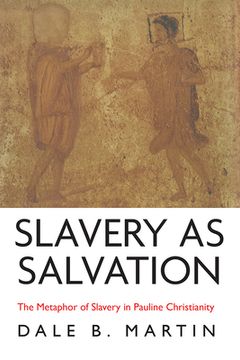Compartir
Slavery as Salvation (en Inglés)
Dale B. Martin
(Autor)
·
Wipf & Stock Publishers
· Tapa Blanda
Slavery as Salvation (en Inglés) - Martin, Dale B.
$ 38.40
$ 64.01
Ahorras: $ 25.60
Elige la lista en la que quieres agregar tu producto o crea una nueva lista
✓ Producto agregado correctamente a la lista de deseos.
Ir a Mis Listas
Origen: Estados Unidos
(Costos de importación incluídos en el precio)
Se enviará desde nuestra bodega entre el
Lunes 12 de Agosto y el
Lunes 19 de Agosto.
Lo recibirás en cualquier lugar de Internacional entre 1 y 3 días hábiles luego del envío.
Reseña del libro "Slavery as Salvation (en Inglés)"
Early Christians frequently used metaphors about slavery, calling themselves slaves of God and Christ and referring to their leaders as slave representatives of Christ. Most biblical scholars have insisted that this language would have been distasteful to potential converts in the Greco-Roman world, and they have wondered why early Christians such as Paul used the image of slavery to portray salvation. In this book Dale B. Martin addresses the issue by examining the social history and rhetorical and theological conventions of the times. The first half of the book draws on a variety of historical sources - inscriptions, novels, speeches, dream-handbooks, and agricultural manuals - to portray the complexity of slavery in the early Roman empire. Concentrating on middle-level, managerial slaves, Martin shows how slavery sometimes functioned as a means of upward social mobility and as a form of status-by-association for those slaves who were agents of members of the upper class. For this reason, say Martin, ""slavery of Christ,"" brought the Christian convert a degree of symbolic status and lent the Christian leader a certain kind of derived authority. The second half of the book traces the Greco-Roman use of political rhetoric that spoke about populist leaders as ""enslaved"" to their followers, especially to members of the lower class. This provides the context for Paul's claim, in 1 Corinthians 9, that he has enslaved himself to ""all"" - that is, to those very people he is supposed to lead as an apostle. Martin thus interprets this statement to mean that Paul identifies himself with the interests of persons with lower status in the Corinthian church, calling on those with higher status to imitate his self-debasement in order to further the interests of those below them on the social scale.
- 0% (0)
- 0% (0)
- 0% (0)
- 0% (0)
- 0% (0)
Todos los libros de nuestro catálogo son Originales.
El libro está escrito en Inglés.
La encuadernación de esta edición es Tapa Blanda.
✓ Producto agregado correctamente al carro, Ir a Pagar.

